Navigating Copyright Laws for Influencer Content Creation
As an influencer or a brand utilising influencer marketing, creating captivating content is your bread and butter. But amidst the filters, hashtags, and aesthetic grids are legal traps and risks. Understanding how copyright works ensures your content is legally sound, protects your creative work, and keeps your partnerships smooth. This guide breaks down the essentials of content creation copyright, fair use, and licensed content, with practical tips to prevent legal trouble.
What Is Copyright, and Why Should Influencers Care?
Copyright is a legal protection for original works like photos, videos, music, or blog posts. It gives the creator exclusive rights to use, share, or reproduce their work. For influencers, this means the content you create is likely protected by copyright as soon as you create it. But it also means you need to respect the copyright of others, like photographers, musicians, or brands.
Ignoring influencer copyright laws can lead to costly consequences: takedown notices, fines, or even lawsuits. For brands, failing to clarify copyright ownership in influencer contracts can spark disputes over who owns sponsored content. Small-to-medium brands and new influencers are especially vulnerable, as they may lack the legal expertise to navigate these waters.
A Quick Example - Using Copyrighted Photos in Content
Say you’re an Instagram Influencer creating a sponsored post for a skincare brand. You use a popular song in your Reel and include a stock photo from a Google search. The post goes viral, but soon you receive a copyright infringement notice because you didn’t have permission to use the song or photo. This could have been avoided with proper licensing or a clear contract outlining content rights.
Key Copyright Considerations for Influencers
To create content safely, influencers and brands need to understand a few core principles. Here’s what to keep in mind:
- Ownership of Your Content: When you create a post, video, or photo, you own the copyright by default unless you’ve licensed it away in a contract. However, brands often want rights to repurpose your content for ads or their website. Always clarify ownership in writing.
- Using Others’ Content: You can’t use someone else’s music, images, or videos without permission. This includes background music in your videos or stock images in your posts.
- Sponsored Content: Brands may expect exclusive rights to the content you create for them. Without a clear agreement, disputes can arise over who can use the content and how.
- International Differences: Copyright laws vary by country. In the U.S., copyright protection is automatic upon creation, but in some countries, you may need to register your work. If you’re collaborating with international brands, check local laws or consult a legal expert.
Fair Use for Influencers
Fair use for influencers is a legal doctrine that allows limited use of copyrighted material without permission, but it’s not that simple. Fair use applies only in specific cases, like commentary, criticism, or parody, and courts consider four factors:
- Purpose and Character: Is your use transformative (e.g., adding new meaning, like a parody) or commercial? Non-commercial uses are more likely to qualify as fair use.
- Nature of the Work: Factual works (like news clips) are more likely to qualify for fair use than creative works (like songs or art).
- Amount Used: Using a small portion of a work (e.g., a 10-second clip of a song) is more likely to be fair use than using the entire thing.
- Market Impact: If your use harms the original creator’s ability to profit from their work, it’s less likely to be considered fair use.
Example - Fair Use on YouTube
Assume you want to create a YouTube video reviewing a new makeup product. You included a short clip from a TV commercial to critique its claims. This might qualify as fair use for influencers because it’s transformative (adding commentary) and uses only a small portion of the original ad. However, if she uses the entire commercial or profits heavily from the video, the brand could argue it’s not fair use.
Fair use is tricky and often decided case-by-case. When in doubt, seek permission or use licensed content for creators to avoid risks.
Licensing Music and Images for Safe Content Creation
Using music or images without permission is a common pitfall for influencers. Here’s how to stay compliant:
- Music Licensing: Popular songs on TikTok or Instagram often require a license for commercial use. Platforms like Epidemic Sound or Artlist offer royalty-free music libraries for creators. Always check the license terms; some allow social media use, while others require additional fees for sponsored posts.
- Image Licensing: Stock photo sites like Shutterstock provide licensed images. Free platforms like Unsplash often allow commercial use, but read the fine print. Avoid grabbing images from Google or Pinterest, as they’re often copyrighted.
- Clearance for Brand Content: If a brand provides assets (e.g., logos or product photos), ensure their contract allows you to use them. Similarly, brands should confirm influencers have rights to any music or images in sponsored posts.
Suppose a small clothing brand hires an influencer, Jake, to promote their new sustainable clothing line. Jake uses a trendy song in his Instagram Story and a stock photo from a random website. EcoWear reposts the Story on their page, but the music’s copyright owner issues a takedown notice, and the stock photo’s creator demands payment. A clear influencer contract from DocLegal.AI could have outlined who’s responsible for securing licensed content for creators, saving both parties from legal headaches.
What to Do When Someone Steals Your Content
Discovering that someone is using your content without permission can be frustrating, but there are steps you can take to protect your rights under influencer copyright laws. Here’s a practical guide to addressing content infringement:
- Document the Infringement: Take screenshots or save evidence of the unauthorised use, including where and when it appeared (e.g., a brand reposting your Instagram Reel without credit or permission).
- Contact the Infringer: Generate a cease and desist letter using DocLegal.AI, requesting that they remove the content or seek permission. Simply choose ‘Cease and Desist Letter - Copyright’ and enter the key details, and your letter will be generated in seconds.
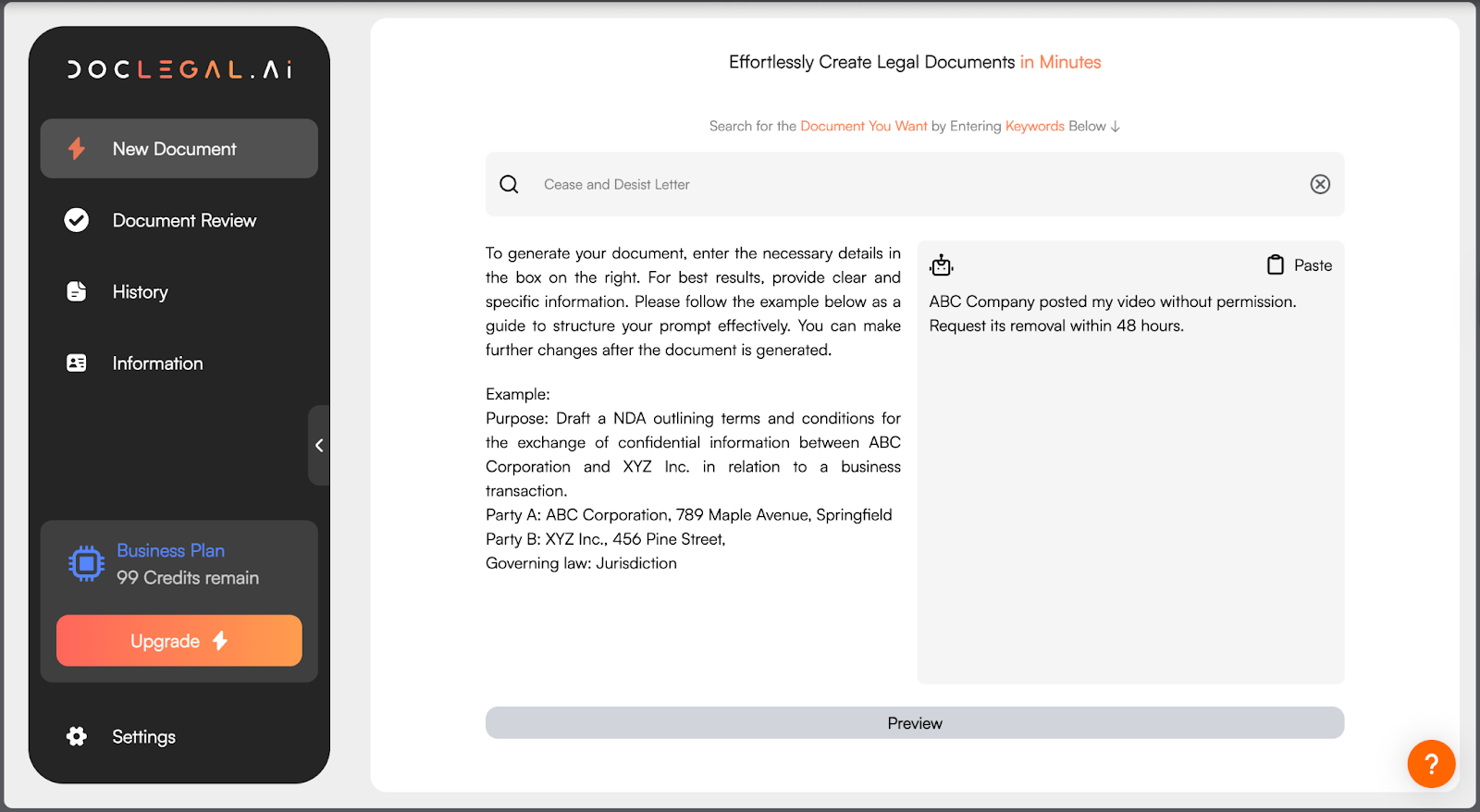
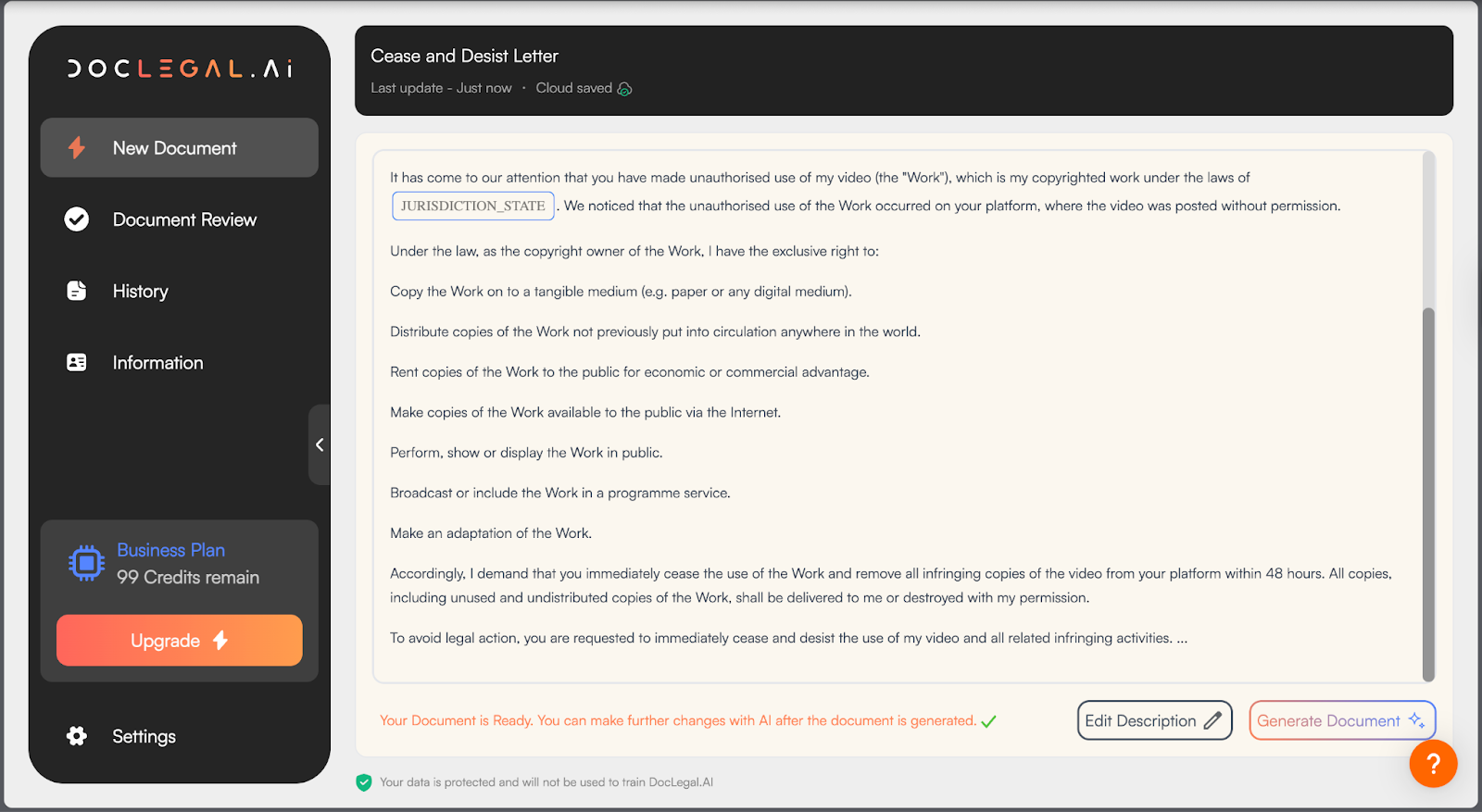
- File a DMCA Takedown Notice: In the U.S., if the infringer doesn’t comply, you can file a Digital Millennium Copyright Act (DMCA) notice with the platform hosting the content (e.g., Instagram, YouTube). Most platforms have a straightforward process for submitting these notices, requiring details like your contact information, the infringed content, and the unauthorised use.
- Consider Legal Action: If the infringement causes significant financial harm (e.g., a brand profiting from your content), consult a lawyer. In the U.S., you may be eligible for damages, especially if your work is registered with the U.S. Copyright Office.
- Prevent Future Issues: Use DocLegal.AI’s influencer contract templates to establish clear ownership and usage rights upfront. For instance, include clauses specifying that brands need written permission to repurpose your content beyond the agreed scope.
Tips to Protect Your Content and Avoid Legal Issues
Here are practical steps to ensure your content creation is legally sound:
- Use Licensed Content: Invest in subscriptions to royalty-free music and image platforms. They’re cost-effective compared to legal disputes.
- Read Contracts Carefully: Before signing a brand deal, review who owns the content and whether you retain any rights. DocLegal.AI’s influencer contract templates can help clarify these terms.
- Watermark Your Work: Adding a subtle watermark to your photos or videos can deter unauthorised use.
- Document Permissions: Keep records of any licenses or permissions for music, images, or brand assets you use.
Why a Solid Influencer Contract Matters
A well-crafted influencer contract is your safety net. It spells out who owns the content, how it can be used, and who’s responsible for legal compliance. Without one, you risk disputes over content ownership, payment issues, or liability for copyright violations. DocLegal.AI makes this easy with customizable influencer contract templates designed for both influencers and brands. These templates cover:
- Content ownership and usage rights

- Payment terms and deliverables

- Licensing responsibilities for music, images, or other assets

- Dispute resolution and termination clauses
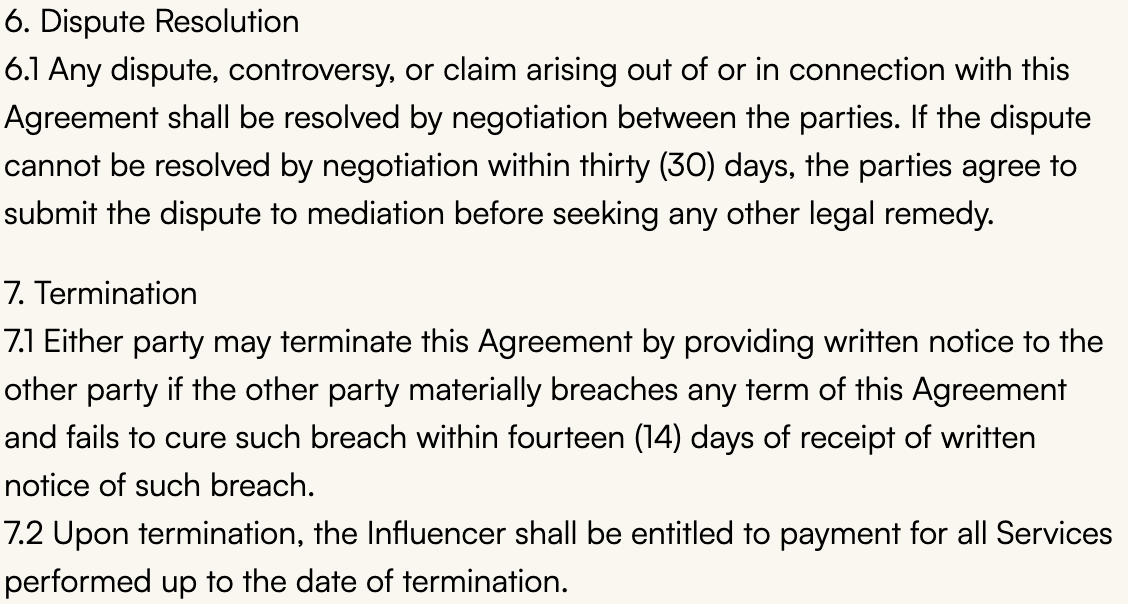
By using a clear contract, you protect your creative work and ensure smooth, professional partnerships.
Frequently Asked Questions (FAQs)
1. What should I do if I accidentally use copyrighted material in my content?
If you realise you’ve used copyrighted material without permission, remove it from your content immediately. Replace it with licensed content for creators. If the content is already live, contact the copyright owner to seek permission or negotiate a license. Using a clear contract from DocLegal.AI can help clarify responsibilities for future collaborations.
2. Can I use a song in my TikTok video if it’s trending on the platform?
Not always. Trending songs on TikTok or Instagram may still require a license for commercial use, especially in sponsored posts. Check the platform’s music library for pre-cleared tracks or use royalty-free music from services like Artlist to comply with influencer copyright laws.
3. How can I tell if my use of someone else’s content qualifies as fair use?
Fair use for influencers depends on factors like whether your use is transformative, non-commercial, and doesn’t harm the original creator’s market. For example, using a short clip for commentary might qualify, but using an entire song likely won’t. When unsure, seek permission or consult a legal expert to avoid risks.
4. What happens if a brand uses my content without permission?
If a brand uses your content without permission, generate a cease and desist letter with Doclegal.AI and contact them to request removal. If they don’t comply, file a DMCA takedown notice with the platform.
5. Do I need to register my content with the U.S. Copyright Office?
In the U.S., copyright protection is automatic when you create content. However, registering with the U.S. Copyright Office strengthens your legal position if you need to pursue damages for infringement. It’s especially useful for high-value content or frequent brand collaborations.
Take Control of Your Content with DocLegal.AI
Navigating influencer copyright laws doesn’t have to be daunting. By understanding fair use, securing licensed content for creators, and using clear contracts, you can focus on creating amazing content. Whether you’re an influencer building your brand or a small business collaborating with creators, DocLegal.AI’s influencer contract templates make it easy to protect your work and avoid legal pitfalls.
Ready to create legally sound agreements? Visit DocLegal.AI today to explore our customizable influencer contract templates. Start crafting professional partnerships with confidence and keep your content creation stress-free!

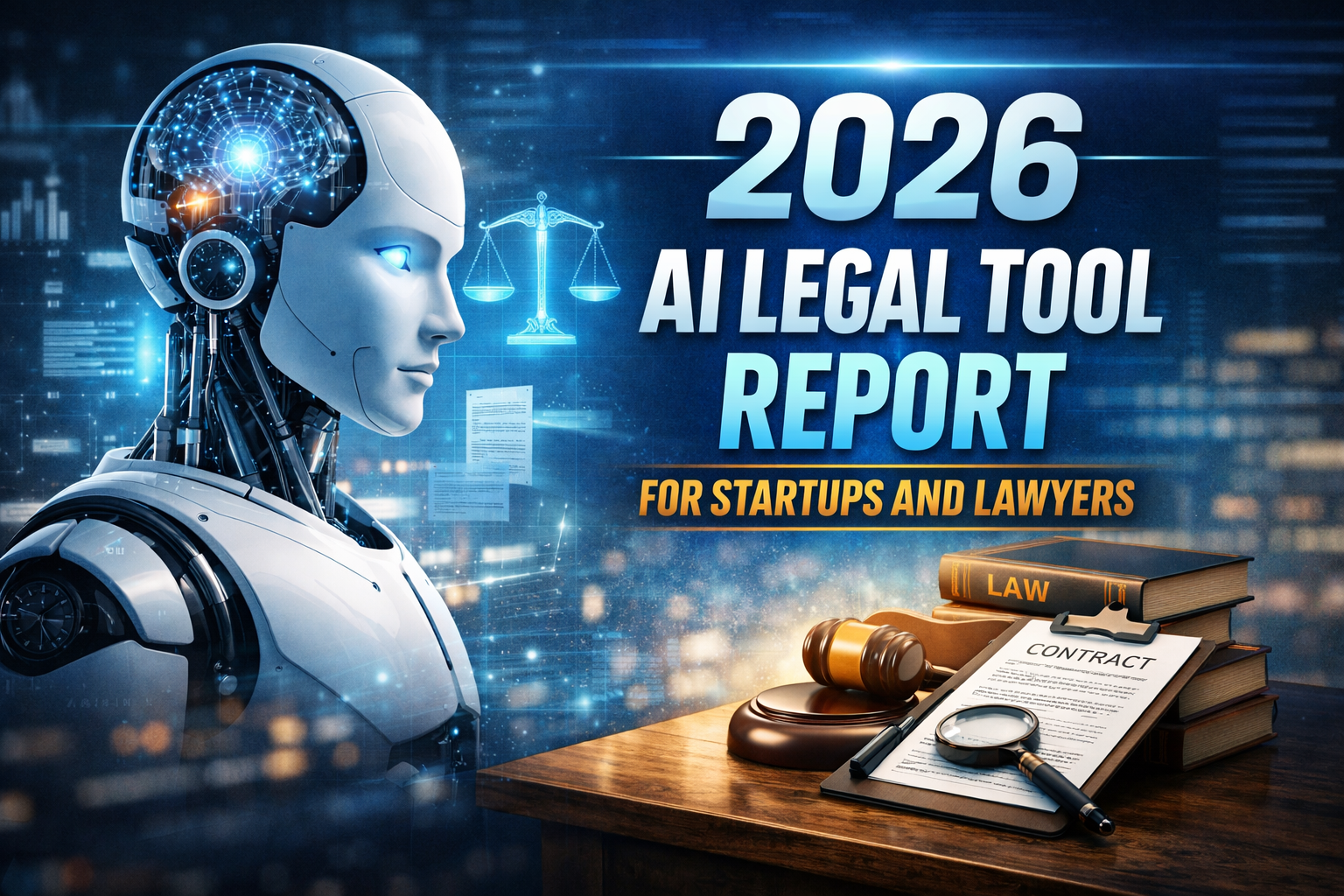
.jpeg)
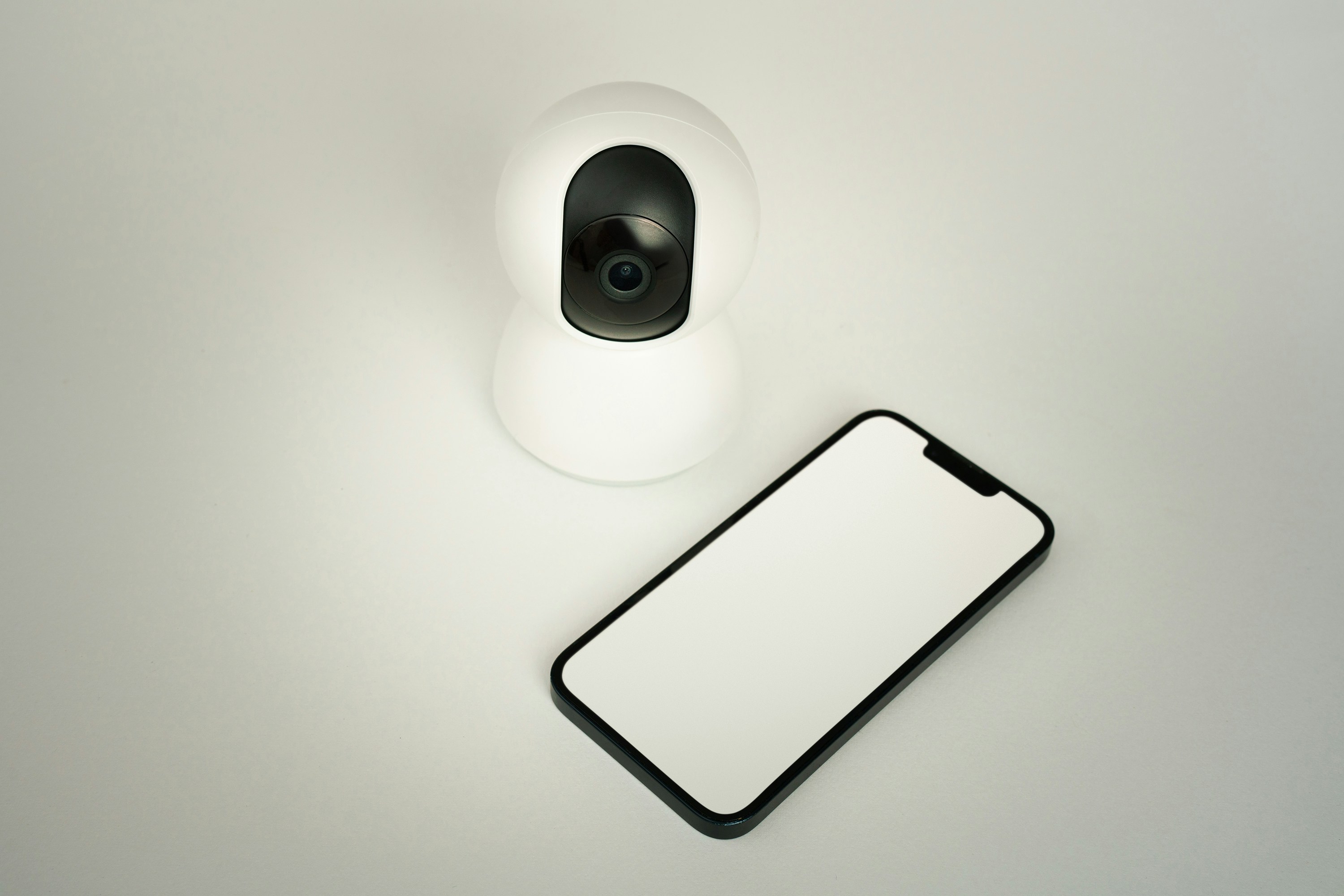

.jpg)
.jpg)